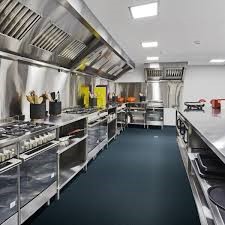
When it comes to designing a commercial kitchen, every detail matters. However, one critical aspect that often gets overlooked is the flooring. The right flooring not only enhances the kitchen’s aesthetics but also ensures safety and efficiency. This post delves into the essentials of commercial kitchen flooring, helping you make informed decisions for your culinary space.
Understanding Commercial Kitchen Flooring Needs
Commercial kitchens are bustling with activity, exposing the floor to constant abuse. From heavy foot traffic to spills, heat, and heavy equipment, commercial kitchen floors are subject to intense conditions and must be chosen carefully. Key factors to consider include:
Durability
Epoxy flooring creates a high-gloss surface that can withstand the rigours of a busy commercial kitchen. It’s resistant to most damages, including scratches from kitchen equipment, impacts from dropped objects, or wear from high-traffic areas. This resistance leads to lower maintenance costs and longer floor life.
Easy to Clean
Hygiene is crucial in any food preparation area. Epoxy floors are non-porous, which means spills from water to oils don’t seep into the floor but stay on the surface, making cleanup quick and easy. This feature also inhibits bacterial growth, contributing to a healthier kitchen environment.
Slip-Resistant
Commercial kitchens can be hazardous due to spills and frequent movement of people and equipment. Epoxy flooring can be customised with anti-slip additives, enhancing safety in these high-risk areas.
Aesthetically Pleasing
Beyond practical benefits, epoxy flooring offers aesthetic flexibility. Available in various colours and finishes, you can customise your floor to match your kitchen’s design aesthetic, making your workspace not only functional but also visually appealing.
Cost-Effective
Compared to other flooring options, epoxy offers high performance at a relatively low cost. Its durability and low maintenance needs mean fewer repair and replacement expenses, making it a cost-effective long-term investment.
Types of Epoxy Flooring
Self-Levelling Epoxy Flooring
Self-levelling epoxy flooring is a resinous flooring solution that, when applied over concrete floors, forms a smooth, self-levelling surface. It’s an ideal option for old, cracked or damaged concrete floors, offering a seamless and shiny finish that can resist wear and tear, even in high-traffic areas.
Self-Dispersing Epoxy Flooring
Self-dispersing epoxy coatings are formulated with special ingredients that allow the coating to spread evenly over a surface without manual spreading. This makes them ideal for large areas and hard-to-reach spaces. They offer all the benefits of traditional epoxy coating durability, chemical resistance and aesthetics with the added convenience of easier application.
Mortar Epoxy Flooring
Mortar epoxy coatings are a type of high-performance coating that combines epoxy resin with a hardening agent. They are known for their exceptional durability and resistance to chemicals, making them ideal for industrial and commercial settings.
When applied, the epoxy resin reacts with the hardener to form a robust, highly adhesive coating. This coating bonds securely to the substrate, forming a seamless, uniform surface that is incredibly resistant to wear, moisture and chemical damage.
Graveled Epoxy Flooring
Gravelled epoxy coating is created by mixing small stones or aggregates with epoxy resin. The resulting mixture is then applied to the surface of a floor, creating a textured and durable finish. The size and type of gravel used can vary depending on the desired level of texture and appearance
Epoxy Terrazzo Flooring
Before we delve into the specifics, it’s crucial to understand what epoxy terrazzo coatings are. Essentially, these are a type of flooring made by embedding small pieces of materials like marble, quartz, glass or granite into an epoxy resin base.
The base is incredibly durable and acts as a binder, holding the decorative aggregates together. The surface is then polished to a glossy finish, resulting in an attractive, hard-wearing floor that can withstand heavy foot traffic with ease.
Epoxy Antistatic Flooring
Epoxy antistatic coatings are a type of industrial floor coating designed to prevent static electricity build-up. Primarily composed of epoxy resins, these coatings have special antistatic agents incorporated into them. When applied to surfaces, they create an environment that controls the dissipation of static electricity, thereby preventing static buildup.
Vapour Barrier Epoxy Flooring
Vapour barrier epoxy coatings are a type of protective coating applied to concrete surfaces to prevent moisture from passing through. This type of coating creates an impermeable layer, sealing the surface and preventing water or moisture from penetrating. These coatings are primarily used in below-grade construction, such as basements, to protect against water ingress.
JetRock Epoxy Flooring
JetRock is a virtually odourless mixture of quartz chips and epoxy resin, and after it’s troweled to a 3/16″ single layer application over existing tile, wood, or concrete surfaces, it hardens into a seamless surface that’s thoroughly slip-resistant, even when greasy or wet. It instals quickly overnight, minimising downtime and lasts up to 10 or 15 years, depending on use. It’s watertight and extremely hygienic. Last but not least, it can withstand the chemical temperature extremes and high wear that are typical in commercial kitchen flooring making it an ideal solution from hotlines to cooler boxes. Other epoxy flooring systems may blend in materials other than quartz, which may be less durable, wear out faster and take longer to install with two or three application layers. $6-8/sq. ft. for materials, $9-14/sq. ft. with installation.
Benefits of Commercial Kitchen Epoxy Flooring
The choice of flooring is a crucial decision in designing any commercial kitchen. It impacts not only the aesthetics, but also the safety, efficiency and overall functionality of your kitchen. Among the many options available, one stands out for its versatility, durability and cost-effectiveness is epoxy flooring.
How to Maintain Epoxy Flooring
While epoxy floors are low-maintenance, they’re not maintenance-free. Regular cleaning with a soft broom and mild detergent will keep your floor shining and extend its lifespan. It is also recommended to reseal the surface every few years to maintain its gloss and protect it from wear.
Additional Considerations
Aside from the benefits mentioned above, there are a few other considerations to keep in mind when choosing epoxy flooring for your commercial kitchen:
Installation Time: Epoxy flooring requires proper surface preparation and curing time which can extend the installation process.
Temperature Sensitivity: Epoxy flooring can become brittle in extreme temperatures so it’s crucial to maintain a consistent temperature in your kitchen.
Professional Installation: To ensure proper installation and avoid any potential issues it’s best to hire a professional contractor with experience in commercial kitchen epoxy flooring.
Overall, with its numerous benefits and customizable options, epoxy flooring is an excellent choice for any commercial kitchen. From small cafes to large restaurants. This type of flooring can enhance the functionality, safety and aesthetics of your workspace while also being a cost-effective investment in the long run.
So, consider epoxy flooring for your next commercial kitchen project and enjoy all its advantages. Overall, with proper maintenance and installation, epoxy flooring can provide immense benefits for your commercial kitchen and contribute to its success. So, consider all the factors mentioned above and make an informed decision for a functional, safe and visually appealing kitchen space.
Conclusion
Commercial kitchen epoxy flooring offers a blend of durability, safety, aesthetics, and cost-effectiveness, making it an ideal choice for demanding environments. By understanding its benefits and maintenance needs, you can make an informed decision that improves the efficiency, safety and visual appeal of your commercial kitchen. So, consider epoxy flooring for your next kitchen design or renovation project and enjoy its long-term advantages.
Choosing the right flooring for your commercial kitchen is a crucial decision that impacts the safety, efficiency and aesthetics of your space. While there are several options available, it’s important to consider your specific needs and consult with a flooring expert before making your choice. Remember, a well-chosen floor not only enhances the visual appeal of your kitchen but also contributes significantly to its overall functionality.
FAQ’s
Are epoxy floors suitable for all types of commercial kitchens?
Yes, epoxy flooring is suitable for all types of commercial kitchens, from small cafes to large restaurants.
How long does epoxy flooring last in a commercial kitchen setting?
With proper installation and maintenance, epoxy flooring can last up to 10 or 15 years in a high traffic environment.
Is professional installation necessary for epoxy flooring?
Yes, it is recommended to hire a professional contractor with experience in commercial kitchen epoxy flooring to ensure proper installation and avoid any potential issues.
Can epoxy flooring be customised to match the aesthetic of my commercial kitchen?
Yes, there are various colour and design options available for epoxy flooring, making it customizable to suit your specific aesthetic needs. So, consider epoxy flooring for your next commercial kitchen project and enjoy all its benefits! Overall, with its versatility, durability and cost-effectiveness, it’s a smart investment that will enhance the functionality and aesthetics of your kitchen space. Keep these FAQs in mind when choosing the right flooring for your commercial kitchen and make an informed decision that contributes to the success of your business. So, why wait? Install epoxy flooring and see the difference it makes in your kitchen! Remember to consult with a flooring expert and maintain your floors regularly for long lasting results.
